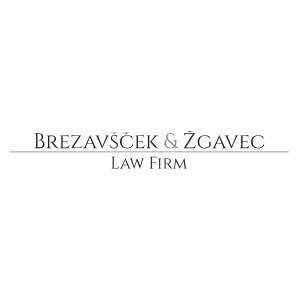Best Acquisition / Leveraged Finance Lawyers in Slovenia
Share your needs with us, get contacted by law firms.
Free. Takes 2 min.
Or refine your search by selecting a city:
List of the best lawyers in Slovenia
About Acquisition / Leveraged Finance Law in Slovenia
Acquisition and leveraged finance refers to the use of borrowed funds to acquire businesses, assets, or companies. In Slovenia, this area of law deals with structuring, negotiating, and documenting loans and other forms of credit for the purpose of facilitating mergers, acquisitions, and buyouts. These transactions are complex and integrate elements of corporate law, banking law, contract law, and regulatory compliance, both at the national and European Union level. Acquisition finance often involves significant sums, multiple parties such as banks, private equity funds, or financial institutions, and requires careful consideration of collateral, security arrangements, and risk allocation.
Why You May Need a Lawyer
Legal advice is essential in acquisition and leveraged finance due to the high stakes, legal complexities, and regulatory requirements. Here are common situations where legal assistance is crucial:
- Structuring the financing of company acquisitions, mergers, or management buyouts
- Navigating Slovenian and EU regulations on lending, anti-money laundering, and competition
- Drafting and negotiating loan documentation, security agreements, and guarantees
- Managing cross-border financial transactions involving Slovenian entities
- Conducting legal due diligence on the target company or assets
- Advising on acquisition-related risks and liabilities
- Resolving disputes among parties or with regulatory bodies
Engaging a lawyer helps ensure compliance, protects your interests, and increases the likelihood of a successful transaction.
Local Laws Overview
In Slovenia, acquisition and leveraged finance transactions are primarily governed by several key pieces of legislation:
- The Companies Act regulates corporate structure, mergers, acquisitions, and corporate governance requirements.
- The Obligations Code sets out general contract law, including principles relevant to loans and guarantees.
- The Banking Act establishes rules for financial institutions, capital requirements, and credit activities.
- The Financial Collateral Act implements EU financial collateral directives, important for security arrangements.
- The Prevention of Restriction of Competition Act addresses antitrust issues in mergers and acquisitions.
- Cross-border transactions may be affected by EU law, including the Capital Requirements Regulation and directives on anti-money laundering, and foreign direct investment rules.
Acquisition and leveraged finance transactions often require approval from regulatory bodies, such as the Slovenian Competition Protection Agency, the Bank of Slovenia, or the Securities Market Agency, depending on the specifics of the deal and the nature of the entities involved.
Frequently Asked Questions
What is leveraged finance in the Slovenian context?
Leveraged finance in Slovenia typically involves using leveraged loans or high-yield bonds to fund acquisitions, often with a relatively high debt-to-equity ratio. These are common in private equity transactions or management buyouts.
Are there limits on how much can be borrowed for acquisitions in Slovenia?
The limits depend on the agreement between the borrower and lender, but financial institutions must comply with prudential regulations set by the Bank of Slovenia and EU supervisory authorities, including capital adequacy and risk management requirements.
What securities can be used to secure acquisition finance?
Common forms of security include mortgages over real estate, pledges over shares, business assets, receivables, intellectual property, and personal or corporate guarantees.
Do acquisition finance transactions require regulatory approval?
Yes, some transactions may require notifications to or clearance from regulatory authorities such as the Competition Protection Agency, particularly if the transaction meets certain turnover thresholds or raises competition concerns.
Can foreign lenders participate in Slovenian acquisition finance deals?
Yes, foreign lenders can participate, but they must comply with Slovenian laws, EU regulations, and any sector-specific requirements, especially if granting security over Slovenian assets.
What is due diligence and why is it important?
Due diligence is the process of investigating the legal, financial, and operational aspects of the target company or assets. It helps identify risks, liabilities, and determines whether the transaction is viable and under what terms.
How is acquisition finance typically structured in Slovenia?
Financing is often a mix of senior and mezzanine loans, sometimes alongside equity contributions. The structure depends on the size of the deal, the risk appetite of lenders, and the type of assets being acquired.
Are there restrictions on financial assistance in Slovenia?
Yes, Slovenian company law restricts financial assistance (such as loans or guarantees) provided by target companies to facilitate the acquisition of their own shares, subject to certain exceptions and procedures.
What happens if there is a default on acquisition finance?
In the event of default, lenders can enforce security interests according to the terms of the agreement and Slovenian law, which may include foreclosure or sale of secured assets, subject to court procedures or out-of-court enforcement where applicable.
What professional fees are involved in acquisition finance transactions?
Legal fees, financial advisory fees, due diligence costs, notary fees, registration costs, and sometimes regulatory or transaction taxes are common. These can vary widely based on transaction size and complexity.
Additional Resources
Several resources and institutions can provide guidance or support on acquisition and leveraged finance in Slovenia:
- Slovenian Bar Association - For finding qualified legal professionals specializing in finance and acquisitions
- Bank of Slovenia - For regulations relating to credit institutions and financial stability
- Slovenian Competition Protection Agency - For guidance on merger control and antitrust issues
- Slovenian Economic Development and Technology Ministry - For guidance on investment, business regulation, and incentives
- Financial Administration of the Republic of Slovenia - For tax and financial regulation guidance
- Slovenian Chamber of Commerce and Industry - For business, financial, and legal resources
Next Steps
If you are considering or involved in an acquisition or leveraged finance transaction in Slovenia, you should take the following steps:
- Define your transaction objectives and identify potential partners or financiers
- Contact a Slovenian lawyer with expertise in acquisition and leveraged finance
- Conduct initial discussions to clarify legal, regulatory, and financial aspects
- Undertake thorough legal and financial due diligence on all relevant parties and assets
- Work closely with your legal counsel to structure and negotiate the transaction
- Ensure all required documentation, registrations, and regulatory notifications are completed
- Monitor compliance post-completion and seek ongoing legal advice for any arising issues or disputes
Professional legal advice is essential to successfully navigate the complexities of acquisition and leveraged finance in Slovenia. Early engagement with specialized legal counsel can help ensure a smooth process and safeguard your interests.
Lawzana helps you find the best lawyers and law firms in Slovenia through a curated and pre-screened list of qualified legal professionals. Our platform offers rankings and detailed profiles of attorneys and law firms, allowing you to compare based on practice areas, including Acquisition / Leveraged Finance, experience, and client feedback.
Each profile includes a description of the firm's areas of practice, client reviews, team members and partners, year of establishment, spoken languages, office locations, contact information, social media presence, and any published articles or resources. Most firms on our platform speak English and are experienced in both local and international legal matters.
Get a quote from top-rated law firms in Slovenia — quickly, securely, and without unnecessary hassle.
Disclaimer:
The information provided on this page is for general informational purposes only and does not constitute legal advice. While we strive to ensure the accuracy and relevance of the content, legal information may change over time, and interpretations of the law can vary. You should always consult with a qualified legal professional for advice specific to your situation.
We disclaim all liability for actions taken or not taken based on the content of this page. If you believe any information is incorrect or outdated, please contact us, and we will review and update it where appropriate.
Browse acquisition / leveraged finance law firms by city in Slovenia
Refine your search by selecting a city.

















